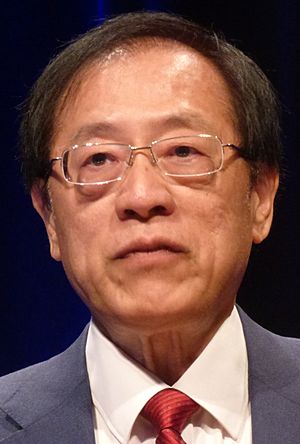Andrew Yao facts for kids
Quick facts for kids
Andrew Chi-Chih Yao
|
|||||||||
|---|---|---|---|---|---|---|---|---|---|
| 姚期智 | |||||||||

Yao in 2015
|
|||||||||
| Born | December 24, 1946 |
||||||||
| Citizenship |
|
||||||||
| Education | National Taiwan University (BS) Harvard University (MA, PhD) University of Illinois, Urbana-Champaign (PhD) |
||||||||
| Known for | Yao's principle | ||||||||
| Spouse(s) | Frances Yao | ||||||||
| Awards | George Pólya Prize (1987) Knuth Prize (1996) Turing Award (2000) Kyoto Prize (2021) |
||||||||
| Scientific career | |||||||||
| Fields | Computer science Theoretical physics |
||||||||
| Institutions | Massachusetts Institute of Technology Stanford University University of California, Berkeley Princeton University Tsinghua University Chinese University of Hong Kong |
||||||||
| Theses |
|
||||||||
| Doctoral advisor | Sheldon Glashow (Harvard) Chung Laung Liu (Illinois) |
||||||||
| Chinese name | |||||||||
| Chinese | 姚期智 | ||||||||
|
|||||||||
Andrew Chi-Chih Yao (Chinese: 姚期智; pinyin: Yáo Qīzhì; born December 24, 1946) is a very important computer scientist and physicist from China. He is known for his work in computational theory, which is about how computers solve problems.
Currently, he is a professor and the head of the Institute for Interdisciplinary Information Sciences (IIIS) at Tsinghua University in China. He developed something called Yao's principle, which uses a math idea called the minimax theorem to understand how hard certain computer problems are.
Yao grew up in Taiwan and studied at National Taiwan University. He earned two Ph.D. degrees. One was in physics from Harvard University, and the other was in computer science from the University of Illinois Urbana-Champaign. He used to be a U.S. citizen but became a Chinese citizen in 2015.
Early Life and Education
Andrew Yao was born in Shanghai, China, in 1946. His family later moved to Hong Kong and then to Taiwan, where he spent his childhood.
He went to Taipei Municipal Chien Kuo High School. After that, he studied physics at National Taiwan University, getting his bachelor's degree in 1967. He then moved to the United States for more studies.
At Harvard University, he earned a master's degree in physics in 1969. He then completed his first Ph.D. in theoretical physics in 1972. His advisor was Nobel Prize winner Sheldon Glashow.
In 1975, Andrew Yao earned a second Ph.D., this time in computer science. He got this degree from the University of Illinois at Urbana–Champaign. His research focused on how complex computer calculations are.
Academic Career and Contributions
Andrew Yao has taught at many famous universities around the world. He was an assistant professor at Massachusetts Institute of Technology (MIT) from 1975 to 1976. Then he taught at Stanford University and the University of California, Berkeley.
From 1986 to 2004, he was a professor at Princeton University. There, he continued his important work on algorithms (steps for solving problems) and computational complexity (how much time and resources are needed).
In 2004, Yao moved to Tsinghua University in Beijing, China. He became a professor and director of the Institute for Theoretical Computer Science (ITCS). Since 2010, he has been the head of the Institute for Interdisciplinary Information Sciences (IIIS) at Tsinghua. He also helped start a big conference called the Conference on Innovations in Theoretical Computer Science (ITCS).
In May 2024, Andrew Yao joined other top AI researchers. They wrote a paper about the serious risks that artificial intelligence (AI) could pose. They said that research into AI safety needs to catch up. They also suggested ways for leaders to manage AI development safely.
Awards and Recognition
Andrew Yao has received many top awards for his amazing work in computer science.
In 1996, he was given the Knuth Prize. This award recognizes major contributions to the foundations of computer science.
He also received the Turing Award in 2000. This award is often called the "Nobel Prize" of computer science. He won it for his important ideas about how computers generate random-like numbers, how cryptography (secret codes) works, and how much information computers need to communicate.
In 2021, he received the Kyoto Prize in Advanced Technology. In 2022, he was named one of the Asian Scientist 100.
Andrew Yao is a member of the U.S. National Academy of Sciences. He is also a member of the American Academy of Arts and Sciences and the Chinese Academy of Sciences. His wife, Frances Yao, is also a well-known computer scientist.
See also
 In Spanish: Andrew Chi-Chih Yao para niños
In Spanish: Andrew Chi-Chih Yao para niños
- Dolev–Yao model
- Garbled circuit
- Hybrid argument
- Yao's Millionaires' Problem
- Yao's principle
- Yao's test
- Yao graph
 | Jackie Robinson |
 | Jack Johnson |
 | Althea Gibson |
 | Arthur Ashe |
 | Muhammad Ali |

